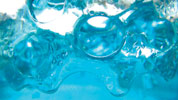

Advanced process control achieves energy saving in the water treatment industry.
Globally, water has become a strategic resource. The specific challenges – such as access to clean drinking water, water pollution and treatment, and regulatory, environment and cost issues – surrounding water stewardship and management do, however, vary from one country to another.
According to Schneider Electric South Africa this tricky environment is compounded further by increasing pressure to reduce operating expenses, curb energy consumption, provide a reliable drinking water supply, bolster equipment safety, align processes with shifting regulations and ensure long-term effectiveness over the lifetime of equipment.
Ravi Saman, water and wastewater manager at Schneider Electric South Africa says that today’s water market is characterised by increasing pressure on costs from both consumers and local governments. “Responding to these demands while maintaining optimal productivity is a real challenge. Nevertheless, it is one that can be met by fine-tuning capacity. But first, water managers need to know exactly how their equipment is operating by reviewing the strategic components of their processes.”
Aeration, he explains, is the most energy-intensive component of the wastewater treatment process. And yet, traditional supervision systems are not sufficient to achieve real savings. “An advanced process control (APC) system can help change this by combining process constraints and complex interactions between the different variables and actuators, predicting the impact of disruptions on operation, coordinating the movements of multiple actuators and taking advantage of all opportunities to reach the equipment’s full potential in terms of quality and efficiency.”
Core APC features are designed to reduce process variability, optimise the working range and ensure compliance with regulatory and environmental requirements. More efficient operation also means substantially lower electrical consumption, which has a direct impact on operating costs. “Up to 35% energy savings can be achieved when an audit is combined with an APC system,” says Saman.
He adds that producing clean water and running equipment 24 hours a day are energy-intensive activities and the hurdle to overcome is guaranteeing quality service while minimising operating expenses and reducing carbon footprint.
“The goal,” he says, “is to optimise operation of motors and pumps by fine-tuning start-up and working ranges. Not only do these improvements lengthen the lifetime of equipment, they also ensure more energy-efficient operation. Real-time information on the status of the network is required so that operators can identify potential risks and take the necessary action. Remote management and smart data analysis can help solve problems before they even become apparent.”
Leaks and burst pipes are regular occurrences on any water distribution network. Not only are these incidents costly, but they can also result in injuries or damage to property. The best way to deal with them is to prevent them from happening in the first place.
“Plant safety is something that cannot be left to chance,” says Saman. “Therefore, make supervision a key part of the process. Video surveillance and presence detectors are nothing new in the water industry. Both techniques are frequently used for water treatment and production plants as well as on water distribution and collection networks. However, surveillance does have its limitations. Traditional surveillance systems cannot respond to break-ins, vandalism, or other malicious acts. Video provides information that supervision systems cannot. By combining video surveillance with a supervision system users can optimise process management.”
He explains that replacing several control systems with a single system can help to lower operating expenses. “In summary, we offer flexible, efficient solutions for water treatment plants and pumping stations that meet local water management challenges around the globe. These solutions can help cut a facility’s operating energy bill, while ensuring optimal reliability, availability and safety.”
For more information contact Jacqui Gradwell, Schneider Electric SA, +27 (0)11 254 6400, [email protected], www.schneider-electric.co.za
| Tel: | +27 11 254 6400 |
| Email: | [email protected] |
| www: | www.se.com/za/en/ |
| Articles: | More information and articles about Schneider Electric South Africa |

© Technews Publishing (Pty) Ltd | All Rights Reserved